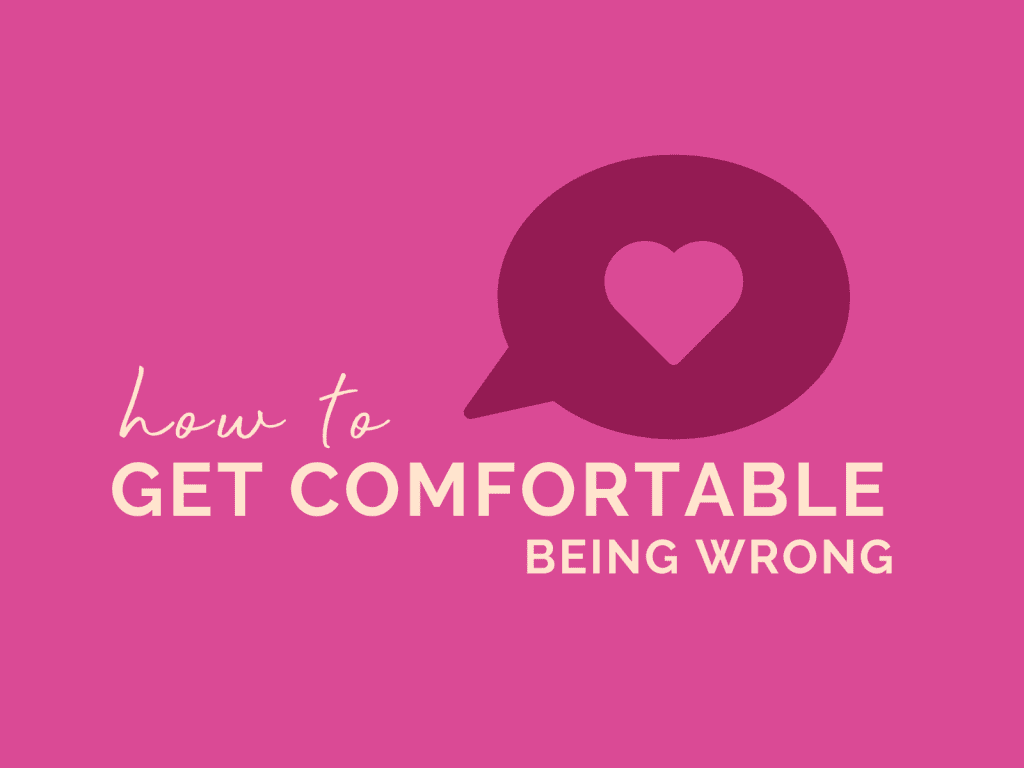Everybody Makes Mistakes: How to Get Comfortable Being Wrong

Everybody makes mistakes, and most of the time, we default to feeling bad and getting defensive when we’re in the wrong. We refuse to admit our weaknesses and won’t take responsibility for our oversights. But those who aren’t afraid to learn from those mistakes get the opportunity to reframe the situation as a way to grow.
You continue to enhance your understanding and appreciation for the world when you make the choice to step out of your comfort zone. Your self-esteem might take a hit when you enter into spaces you aren’t accustomed to, but by stepping into these circles with patient humility, listening ears, and an open heart, some really wonderful and enlightening conversations and connections begin.
Here are some things to keep in mind when you make mistakes throughout your life.
Apologize Without a Qualifier
“I’m sorry if you took what I said the wrong way.”
“I don’t think I did anything wrong, but I’m sorry, I guess.”
“I’m sorry, but…”
Heard any of these half apologies before? They don’t feel particularly sincere.
When you apologize by adding a “but,” you’re refusing to take full responsibility for your actions. You’re admitting that you don’t genuinely believe you’re at fault, but you recognize that someone expects an apology. It’s almost worse than refusing to apologize.
Before you apologize, make sure you truly and fully understand what you did wrong. Try to understand why your actions negatively impacted another person, and step into their shoes to feel what they feel. You might have to admit to yourself that there’s no way for you to understand how they feel if you don’t have the same life experiences as they do.
When you are ready to apologize, outline what you did wrong so the other person knows you understand precisely what you did and why you accept the blame. Make the apology in person so that you can make sincere eye contact.
Once you finish, don’t expect forgiveness right away. The presence of an apology does not necessitate a transaction of forgiveness. Say that you understand if they need some time to consider the apology before they’re ready to offer forgiveness. Ask if there’s anything you can do to right your wrong, and admit that you’re willing to learn.
Educate Yourself on Your Own Time
Members of marginalized communities are not your personal Google.
Especially in times of trauma, someone directly impacted by a situation may not have the emotional availability to explain their reality to you. If the Supreme Court passes restrictive policies against the LGBTQ+ community, it’s not the time to go to your friend who identifies as transgender and ask them why pronouns are important.
Go online, find reputable sources and accounts from people within that community. If you’re reading about police brutality against Black men, try to find accounts from scholars and Black men who have experienced that brutality. These resources are available to you so you can take the time to educate yourself. In the future, you can enter into the conversation in a more receptive, educated manner.
Even though they may have good intentions, some will reach out to members of these communities to get “brownie points” or positive feedback, to let their acquaintance know that they’re “one of the good ones.” No matter how “woke” you are, if you are in the privileged group, you benefit from the system of privilege, and members of the marginalized community cannot absolve you of that position. Reach out to them to support their needs, not to get answers or recognition for yourself.
Listen With the Intent to Learn, Not Refute
It’s common for conversations to go nowhere when people only listen for an opening in the conversation. When this happens, it’s just two people standing in the same room talking to no one. No ideas get exchanged, and no productive dialogue happens.
If someone has more personal experience with an issue, they aren’t engaging in a hypothetical debate; they’re telling you about their lived experience. No amount of research or reading will give you the ability to negate or supersede that lived experience.
If you’re listening to them, genuinely engage in order to learn. Help them feel more confident when they share their story by thanking them for their input and trusting you with their story. You’ll have a better chance at achieving your goal of a deeper understanding of current issues if you help them feel trusted and valued when they share their insight with you.
Give Yourself Compassion When You Falter
Everyone screws up. Accepting that mistakes are a part of life helps you stop your embarrassment from clouding your opportunity to learn. If you go through life never admitting your mistakes, you’ll hurt a lot of people and you’ll stunt your emotional and intellectual growth.
If you make a mistake and have the intention of using it as an opportunity to learn, cut yourself some slack. You’ll have a greater self-confidence the more you try to learn and engage with an issue.
Always Look for a Chance to Learn
If you go through life trying to be perfect at every first try, you’ll miss out on a lot of opportunities due to your fear of failure. Strike up a conversation at work with the person who uses they/them pronouns. Engage in a dialogue with people who hold different political beliefs than you. Watch movies and TV shows produced by and starring underrepresented directors and actors.
Everybody makes mistakes, but not everyone tries to learn from them. Use your missteps as an opportunity to grow.
Author, Artist, Photographer.
Sarah Margaret is an artist who expresses her love for feminism, equality, and justice through a variety of mediums: photography, filmmaking, poetry, illustration, song, acting, and of course, writing.
She owns Still Poetry Photography, a company that showcases her passion for capturing poetic moments in time. Instead of poetry in motion, she captures visual poetry in fractions of a second, making cherished keepsakes of unforgettable moments.
She is the artist behind the Still Poetry Etsy shop, which houses her illustrations and bespoke, handmade items. She is the author of intricacies are just cracks in the wall, a narrative poetry anthology that follows a young woman discovering herself as she emerges from an abusive relationship.






Responses